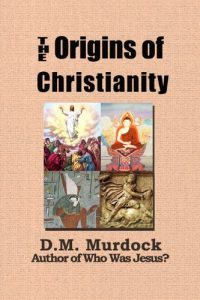Around the world over the centuries, much has been written about religion, its meaning, its relevance and contribution to humanity. In the West particularly, sizable tomes have been composed speculating upon the nature and historical background of one of the main characters of Western religions, Jesus Christ. Many have tried to dig into the precious few clues as to Jesus's identity and come up with a biographical sketch that either bolsters faith or reveals a more human side of this godman to which we can all relate. Obviously, considering the time and energy spent on them, the subjects of Christianity and its legendary founder are very important to the Western mind and culture, and increasingly to the rest of the world as well.
Despite all of this literature continuously being cranked out and the significance of the issue, in the public at large there remains a serious lack of formal and broad education regarding religion and mythology, and most individuals are highly uninformed in this area. Concerning the issue of Christianity, for example, the majority of people are taught in most schools and churches that Jesus Christ was an actual historical figure and that the only controversy regarding him is that some people accept him as the Son of God and the Messiah, while others do not. However, whereas this is the raging debate most evident in this field today, it is not the most important. Shocking as it may seem to the general populace, the most enduring and profound controversy in this subject is whether or not a person named Jesus Christ ever really existed.
Contents
Introduction
The Controversy
History and Positions of the Debate
"Pious Fraud"
The Proof
The Gnostics
Biblical Sources
Non-Biblical Sources
The Characters
The Major Players
Buddha
Buddha's Birth
Buddhist Crucifixion
Horus of Egypt
Mithra, Sun God of Persia
Mithra's "Virgin" Birth?
Mithra and the Twelve
Krishna of India
Krishna's "Virgin" Birth?
The Names of Krishna and Christ
Krishna's Solar Nature
Prometheus of Greece
The Creation of a Myth
The "Son" of God is the "Sun" of God
Etymology Tells the Story
The Book of Revelation is Egyptian and Zoroastrian
The "Patriarchs" and "Saints" are the Gods of Other Cultures
The "Disciples" are the Signs of the Zodiac
Was Jesus an Essene Master?
Qumran is Not an Essene Community
Was the New Testament Composed by Therapeuts?
Conclusion
Bibliography
Endnotes
Despite all of this literature continuously being cranked out and the significance of the issue, in the public at large there remains a serious lack of formal and broad education regarding religion and mythology, and most individuals are highly uninformed in this area. Concerning the issue of Christianity, for example, the majority of people are taught in most schools and churches that Jesus Christ was an actual historical figure and that the only controversy regarding him is that some people accept him as the Son of God and the Messiah, while others do not. However, whereas this is the raging debate most evident in this field today, it is not the most important. Shocking as it may seem to the general populace, the most enduring and profound controversy in this subject is whether or not a person named Jesus Christ ever really existed.
Contents
Introduction
The Controversy
History and Positions of the Debate
"Pious Fraud"
The Proof
The Gnostics
Biblical Sources
Non-Biblical Sources
The Characters
The Major Players
Buddha
Buddha's Birth
Buddhist Crucifixion
Horus of Egypt
Mithra, Sun God of Persia
Mithra's "Virgin" Birth?
Mithra and the Twelve
Krishna of India
Krishna's "Virgin" Birth?
The Names of Krishna and Christ
Krishna's Solar Nature
Prometheus of Greece
The Creation of a Myth
The "Son" of God is the "Sun" of God
Etymology Tells the Story
The Book of Revelation is Egyptian and Zoroastrian
The "Patriarchs" and "Saints" are the Gods of Other Cultures
The "Disciples" are the Signs of the Zodiac
Was Jesus an Essene Master?
Qumran is Not an Essene Community
Was the New Testament Composed by Therapeuts?
Conclusion
Bibliography
Endnotes






